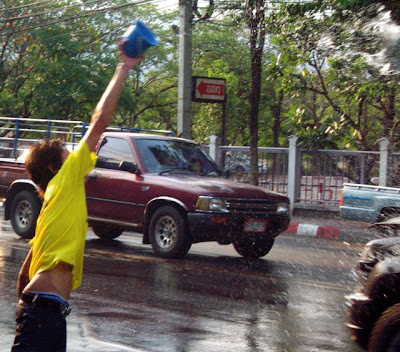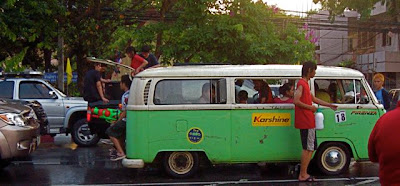
Chiang Mai.com gives an overview of the holiday of Songkran.
The family sprinkling scented water from silver bowls on a Buddha image is a ritual practiced by all Thais in on the third day of Songkran, known as Wan Payawan. This is the first official day of the New Year and on this day people cleanse the Buddha images in their homes as well as in the temples with scented water. The family is dressed in traditional Thai costume and wearing leis of jasmine flower buds. The water is scented with the petals of this flower.

There was a table at the entrance of our building with a small Buddha and some fragrant water. But when we ventured out into the streets we found the modern Chiang Mai Songkran of tossing water on passers by.
In addition to the cleansing of the Buddha images a traditional Songkran involves the sprinkling of water by younger people on the older people as a tribute of respect and for blessings. This is much different from the water tossing we see on the streets and is a genuinely sincere event whereby scented water is poured over the shoulder and gently down the back of the person. While pouring the water in this manner, people utter good wishes and words of blessing for the New Year. The water symbolizes cleansing, refreshment of the spirit and all good things associated with life.
 J had already gotten wet. But when it's 100° Fahrenheit (over 37°C) wearing wet clothes feels great.
J had already gotten wet. But when it's 100° Fahrenheit (over 37°C) wearing wet clothes feels great. This man had a plastic case to carry his phone in. So did a lot of other folks it turned out.
This man had a plastic case to carry his phone in. So did a lot of other folks it turned out. Chiff.com adds more information:
Chiff.com adds more information:Songkran (สงกรานต์) is the traditional Thai New Year Festival which starts on April 13 every year.The word Songkran comes from the Pali language of the Therevada Buddhist scriptures (Sankhara) and the Sanskrit word (Sankranti) for movement or change.
In ancient times, it was celebrated as a moveable feast, and set to occur as the sun moved into the Aries portion of the zodiac. In modern times the date has been fixed as April 13.
Although the Thai people officially changed the New Year to January 1 in 1940 to coincide with the Western business world, the traditional Songkran Festival is still celebrated as a national holiday.
The festival lasts for 4 days. Maha Songkran Day

is the first day of the celebrations which marks the end of the old year. April 14, Wan Nao is the day between the ending of the old year and the beginning of the new year when foods are prepared for the temples. The third day of Songkran, April 15, is Wan Thaloeng Sok - the day on which the New Year begins and on the last day, Wan Parg-bpee, the ancestors and elders are honored.














 And walking past the monk housing, we learned that the older monks have power water weapons too.
And walking past the monk housing, we learned that the older monks have power water weapons too.



















